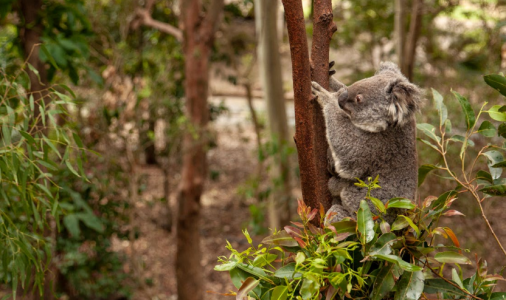Discover what a sniffer dog found in the Aussie bush that's being compared to 'striking gold'
By
Gian T
- Replies 2
Australia's bushland is home to a myriad of hidden treasures, but none quite as precious as the recent discovery made by a team of wildlife researchers and a very special four-legged assistant. In a breakthrough that's being hailed as 'striking gold' for koala conservation, a new community of koalas has been found in Fernbrook, inland of Coffs Harbour, thanks to the keen nose of a 'poo-sniffing English springer spaniel' named Max.
This discovery is not just rare; it's incredibly significant. The koalas in this newfound community are both chlamydia-free and genetically distinct, a combination that is becoming increasingly scarce in New South Wales (NSW). Chlamydia, a disease that has been ravaging koala populations, leads to severe reproductive issues, blindness, and kidney damage, contributing to the decline of these iconic marsupials. In some areas of NSW, infection rates have soared to between 80 and 100 per cent, making the Fernbrook particularly momentous given the endangered status of koalas in the state. With some estimates predicting potential extinction by 2050, the urgency to protect these animals has never been greater.
Dr Stuart Blanch, a conservation scientist with WWF-Australia, spoke to Yahoo News Australia about the dire consequences of chlamydia on koalas and the importance of this discovery. 'It can reduce or prevent successful breeding of koalas. That’s why finding a chlamydia-free group is like striking gold,' he explained. The Fernbrook koalas not only have the potential to breed successfully but also to produce future generations with higher resilience to climate change.
But why is it so significant to find both chlamydia-free and genetically diverse koalas in NSW? Genetic diversity is crucial for a population's ability to resist diseases, and in koalas, a lack of it makes them more susceptible to infections. Urban development, agriculture, and deforestation have fragmented koala habitats, limiting their movement and the ability to find unrelated mates. This leads to isolated populations with reduced genetic pools and increased inbreeding, which can have detrimental effects on their long-term survival.
The team from Canines for Wildlife, along with Max, surveyed 115 sites across the Coffs Harbour and Bellingen areas, from coastal regions to the Dorrigo Plateau. Their findings have sparked a call for a halt to logging in state forests that contain vital koala food and habitat trees. While the group of 10 koalas in Fernbrook are on private properties and safe from logging, the wider population around Coffs Harbour is not.
A total of 109 poo samples collected in 2022-2023 have been sent for genetic testing at the University of the Sunshine Coast. Lynn Baker from Canines for Wildlife emphasised the importance of protecting this new colony. 'We knew the koalas at Fernbrook looked different... They are a lot furrier and darker in colour than their compatriots on the coast,' she said. 'But if this is a genetically different and a chlamydia-free group, then it’s important that they are protected.'
The discovery raises questions about whether these koalas are isolated or connected to other chlamydia-free populations yet to be sampled. Canines for Wildlife plans to conduct further surveys to explore this possibility.
With koala numbers in NSW having decreased by 33 to 61 per cent since 2001, driven by habitat destruction, climate change, disease, and urbanisation, and the devastating 2019–2020 bushfires killing at least 6,400 koalas, the protection of healthy populations like the one in Fernbrook is critical.
 Our beloved Aussie environment is full of wonders, and this discovery is a beacon of hope for the future of one of our most cherished native animals. As members of the Seniors Discount Club, we can all appreciate the importance of preserving our natural heritage for future generations. Let's celebrate this 'golden' find and continue to support conservation efforts that keep our weird and wonderful Australian bush thriving.
Our beloved Aussie environment is full of wonders, and this discovery is a beacon of hope for the future of one of our most cherished native animals. As members of the Seniors Discount Club, we can all appreciate the importance of preserving our natural heritage for future generations. Let's celebrate this 'golden' find and continue to support conservation efforts that keep our weird and wonderful Australian bush thriving.
This discovery is not just rare; it's incredibly significant. The koalas in this newfound community are both chlamydia-free and genetically distinct, a combination that is becoming increasingly scarce in New South Wales (NSW). Chlamydia, a disease that has been ravaging koala populations, leads to severe reproductive issues, blindness, and kidney damage, contributing to the decline of these iconic marsupials. In some areas of NSW, infection rates have soared to between 80 and 100 per cent, making the Fernbrook particularly momentous given the endangered status of koalas in the state. With some estimates predicting potential extinction by 2050, the urgency to protect these animals has never been greater.
Dr Stuart Blanch, a conservation scientist with WWF-Australia, spoke to Yahoo News Australia about the dire consequences of chlamydia on koalas and the importance of this discovery. 'It can reduce or prevent successful breeding of koalas. That’s why finding a chlamydia-free group is like striking gold,' he explained. The Fernbrook koalas not only have the potential to breed successfully but also to produce future generations with higher resilience to climate change.
But why is it so significant to find both chlamydia-free and genetically diverse koalas in NSW? Genetic diversity is crucial for a population's ability to resist diseases, and in koalas, a lack of it makes them more susceptible to infections. Urban development, agriculture, and deforestation have fragmented koala habitats, limiting their movement and the ability to find unrelated mates. This leads to isolated populations with reduced genetic pools and increased inbreeding, which can have detrimental effects on their long-term survival.
The team from Canines for Wildlife, along with Max, surveyed 115 sites across the Coffs Harbour and Bellingen areas, from coastal regions to the Dorrigo Plateau. Their findings have sparked a call for a halt to logging in state forests that contain vital koala food and habitat trees. While the group of 10 koalas in Fernbrook are on private properties and safe from logging, the wider population around Coffs Harbour is not.
A total of 109 poo samples collected in 2022-2023 have been sent for genetic testing at the University of the Sunshine Coast. Lynn Baker from Canines for Wildlife emphasised the importance of protecting this new colony. 'We knew the koalas at Fernbrook looked different... They are a lot furrier and darker in colour than their compatriots on the coast,' she said. 'But if this is a genetically different and a chlamydia-free group, then it’s important that they are protected.'
The discovery raises questions about whether these koalas are isolated or connected to other chlamydia-free populations yet to be sampled. Canines for Wildlife plans to conduct further surveys to explore this possibility.
With koala numbers in NSW having decreased by 33 to 61 per cent since 2001, driven by habitat destruction, climate change, disease, and urbanisation, and the devastating 2019–2020 bushfires killing at least 6,400 koalas, the protection of healthy populations like the one in Fernbrook is critical.
Key Takeaways
- Researchers, with the help of a 'poo-sniffing' dog named Max, have discovered a chlamydia-free and genetically distinct koala population at Fernbrook, NSW.
- Chlamydia in koalas is a leading cause of their decline in Australia, making this finding significantly important for conservation efforts.
- Conservationists are celebrating the discovery and are advocating for a halt to logging in state forests that are crucial for koala habitats.
- Further testing and surveys are planned to ascertain the extent of this healthy koala population and to reinforce strategies for their protection.








